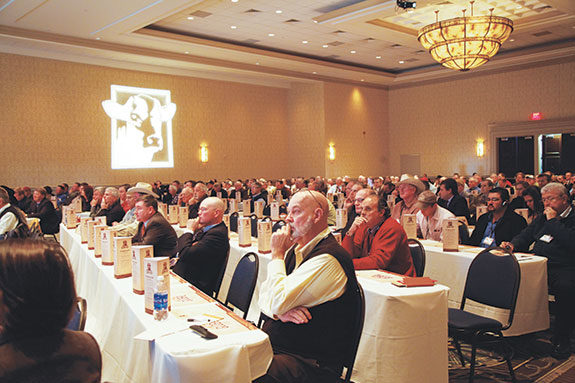More than 560 people from all over the world arrived in Lexington, Kentucky, for Alltech’s Global 500 in December. Farmers and producers from the beef and dairy industries came from as far away as Argentina, Afghanistan, Serbia, Slovakia and Switzerland to hear about the future of animal production and how to stay profitable by focusing on the three pillars of successful farming: efficiency, profitability and sustainability.
“With the world focusing on feeding nine billion people, there is a need to maximize productivity while minimizing environmental impact,” said Dr. Pearse Lyons, president and founder of Alltech. “This year’s attendees have commented that tomorrow’s farmers need to be conscious of their brand.
 "They are asking if, in order to remain profitable, we need to return to the old way of delivering milk: in a bottle on the doorstep. There are also incredible breakthroughs in crop science to consider.
"They are asking if, in order to remain profitable, we need to return to the old way of delivering milk: in a bottle on the doorstep. There are also incredible breakthroughs in crop science to consider.
Researchers are currently discussing the possibility of producing a ton more grain per acre, a gain that would revolutionize farming. The U.S. alone could represent 100 million tons of grain.”
Instability in the dairy and beef industries did not manage to dampen the spirits of attendees at this year’s event. Instead, there was a consensus that something needed to be done. Speakers focused on what producers could do to regain control of their markets.
Jack Corless, global dairy consultant at Rumsol, advised that farmers should “look at components that contribute a hierarchy of needs: environment, management, agronomy, nutrition. We need to look at how we manage that animal.
Then look at fermentation, the rumen, the nutrition. Before we look at nutrition, we need to look at environment. Each of these animals has a maintenance cost, no matter the cost of production.”

Carbon footprint was also a hot topic, with Kevin Tuck of Alltech discussing the opportunities that come with this new issue.
“The more productive the cow, the lower the emissions are,” Tuck said. “We need to increase milk yield or weight gain per cow, feed lower-carbon ingredients – so no soybean meal – manage dietary proteins and improve overall feed efficiency.
Carbon footprinting is not an imposition but rather a fantastic opportunity to make us more efficient and increase our margins out of this system.”
Farmers and producers from around the world shared their unique regional challenges and successes with each other, and all went away with something new to consider.
For more information on Global 500 and more detailed information about the presentations, visit the Alltech blog and, for photos, visit Alltech’s online photo gallery. Presentations can be viewed on-demand through the AlltechAgNetwork.
Alltech used the Global 500 event to launch their "Dairy Heroes" campaign. According to Carrie Mess's video interview with Alltech's Laurna Fay , the campaign is intended to celebrate dairy producers.
"[We're trying to recognize] the people who go that extra mile to put milk on the table," Fay says. "The people who just don't get the recognition that they totally deserve."
Alltech asked attendees to go online to nominate their dairy heroes online. The December winner they selected was the late Indiana dairywoman Leontien VandeLaar, and she received $200 and a dairy hamper. Click here to read a tribute blog to Leontien, written by PD Editor Emily Caldwell.
Event attendees were also able to pose with a backdrop featuring a hero in a cape.
Progressive Dairyman staff thinks another good candidate for the dairy heroes award would be Vale Wood Farms in Loretto, Pennsylvania. Click here to read about why Alltech employee Marcia Itle wanted to highlight her family's operation. PD
PHOTOS
TOP: Dr. Pearse Lyons challenges delegates at the opening session to dream, dare, desire, decide, and dedicate.
BOTTOM: Visitors to the conference examine Alltech’s vision of the farm of the future. Photos courtesy of Alltech.




